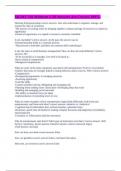MGMT 310 Midterm || All Answers Are Correct 100%.
Defining Entrepreneurship correct answers -One who undertakes to organize, manage, and
assume the risks of a business
-The process of creating value by bringing together a unique package of resources to exploit an
opportunity
-Pursuit of opportunity w/o regard to resources currently controlled
Is ent. teachable? correct answers -In the past, the answer was no
-Entrepreneurship holds to a common process
-That process is teachable, and there are common skills underlying it
Is ent. the same as small business management? How are they the same/different? correct
answers -NO
-To be successful as a manager, you need to be good at...
-Basic technical competencies
-Managerial competencies
What are some of the traits commonly associated with entrepreneurs? There is very limited
evidence that traits are strongly linked to startup behavior and/or success. Why? correct answers
-Competencies:
-Recognizing opportunity -Leveraging resources
-Assessing opportunity
-Guerrilla skills
-Creative problem-solving -Mitigating and managing risk
-Planning when nothing exists -Innovation- developing ideas that work
-Building and managing social networks
-The ability to maintain focus yet adapt
-Implementation of something novel or new
What are some examples of how entrepreneurs might think differently, both from non-
entrepreneurs, and from each other? correct answers -Intuitive vs. Analytical
-Cognition bias (Confirmation bias, self-serving bias, optimistic bias)
-Heuristics: quick rules of thumb for making complex decisions and judgments (Availability,
representatives)
-Causation vs. Effectuation (infinite outcomes)
Why do entrepreneurs start firms? What types of motivation exist here? correct answers -Pull
Factors: Autonomy, pursue passion, financial reports, control, teamwork legacy
-Push Factors: necessity
Ents. are born, not made correct answers False
Ents. are gamblers correct answers False, calculated risk takers
Most ents. are investors correct answers False
, Ents. are motivated by primarily money correct answers False, passion
Ents. are academic and social misfits correct answers False
The most important thing etns. need is money correct answers False
9 out of 10 (closer to 5 out of 10) small businesses fail in the first year correct answers True
What is an opportunity? Where do entrepreneurs look to discover opportunities (3 main areas)?
correct answers -Opportunity: favorable set of circumstances creating a need for a new product,
service, or business
-A situation where something can be improved at a profit
-The existence of "pain" that can be removed—something is unsatisfactory
-A perceived means of generating economic value (profit) that has not been previously exploited
- Areas: Trends, Problems, Gaps
-Understand how trends give rise to opportunities. What types of trends are there? Be able to
identify specific trends underlying businesses we've spoken of. correct answers -Social Trends:
*Aging demographics, interest in health & fitness, environmental awareness, senior living, clean
energy, going green (coconut water, CrossFit)
Technological Trends:
*Portability, all-in-one devices, 3D technology, cloud computing, iPhone/iPad apps (drones,
airstrip, nearables)
-Economic Trends:
*Strong/weak, more part time/flexible employees, dual earning families, less job security
(BenchPrep, Etsy, Groupon)
Government/Regulatory Trends:
*Health care changes, alternative energy emphasis, home ownership, no child left behind
-Unexpected Occurrences:
*9/11 terrorism, high gas prices, high rate of foreclosures
What are 'gaps in the marketpalce'? correct answers -Mass retailers focus on the mainstream
-This leaves considerable gaps for niche markets: are often identified when people become
frustrated they can't find a product/service they need
-Examples: Daisy Rock guitars for girls
-Anybots (mobile telepresence)
-Kazoo toy store (developmental toys)
What factors explain why some individuals are better than others at identifying new business
opportunities? How can you improve your ability to identify opportunities? correct answers -
Prior Experience
-40% of Inc 500 got ideas on the job
-Different types of experience: entrepreneurship, industry, etc.
-Cognitive Factors
-Entrepreneurial alertness




